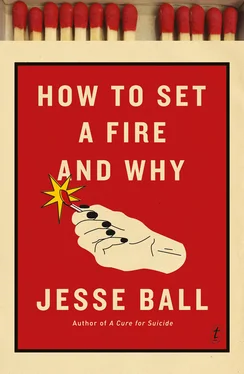They called me back in and gave me an exam booklet. There was a question written on the board. The question was:
Why Hitler?
On the first page of the exam booklet it said I could write as much or as little as I felt like. It said it in this way:
An answer of any length might be sufficient .
I thought about it for a little bit and didn’t write anything. I figured the fewer cross-outs the better. Also—I figure, any part of it might be the test, so I should hoof it and get something down, since they might be watching through a camera and might disallow whatever I write after the first five minutes. That’s how I would do the test, if I were them. My aunt would think of some even sneakier shit, I bet. Like, someone talks to you in the waiting room before the test, and that is the test.
I thought about that, and then thought about thinking about that, about her, and then I thought about her husband and how it was funny that in his letter he hadn’t seemed that smart, but maybe he was smart in some other way. Or maybe he was nervous writing letters from a military barracks, so he did it in a strictly ordinary way. That could be why she kept the letter. It was some sort of bravura performance of writing a lame soldier-letter-home-to-his-sweetheart. I bet there are coded parts I didn’t understand.
So, why Hitler?
There are a few questions I could answer. I figure the test wasn’t so much about what I wrote, but about which question I could intuit.
Why Hitler? could be:
Why was “Hitler” the one who committed a nice fat genocide and captivated the world as a figure of evil, where “Hitler” is the particular archetype of a Hitler sort of person, of which there might be several. If you imagine there are many sorts of evil archetypes, the question could be—why this “Hitler” rather than a different Hitler. In other words, if the world were a bit more faintly greenish colored, and a butterfly flapped its wings into tatters in a zoological garden in Brussels, maybe the Hitler that we would have gotten would have been a different one. Maybe he would have loved peacocks or something, and used gypsy musicians for his military marching bands. He’d still have been bad—just a different sort of bad, right?
According to this logic, I would have to say, my answer is: pick any event, historically, that you want: the dauphin stubbing his toe, for instance, and it’ll lead you right on to this particular “Hitler.” Change any of those things, and you get peacock Hitler. We’ll just class whichever of the other Hitlers gets chosen as peacock Hitler. You understand, we aren’t specifying anything other than that he’s the one who appears when the dauphin doesn’t stub his toe.
But, there are other why Hitlers, and maybe a different one is more interesting. It could be why Hitler?, as in, why did this man, “Hitler,” manage to become Hitler? As in, within the span of his life, how did an ordinary person transform into a monstrous sort of venal godhead and can the reason be found in his actual physical body, or was it just the events that surrounded him and swept him along? So, in my answer, I would be choosing from between those two, sort of a nature versus nurture thing.
A third option is, why Hitler?, as in, why are we asking you about Hitler? That’s a tricky question. There are some obvious answers, like because the idea of Hitler freaks people out and makes them behave badly. It reduces people to intellectual weaklings often. So, the why there would be—because you are trying to reduce me to an intellectual weakling.
Another reason along those lines is: to get rid of a cultural advantage. Pretty much everyone has heard about Hitler and can say some clever Hitler stuff, so it doesn’t test historical knowledge very much. I mean, maybe there’s a Malaysian punk band called Hitler, and if somebody writes about that, they do fine.
But, I think the best question asked by the question, why Hitler? is: why do we as humans refuse to recognize that a life has fixed proportions and can’t go beyond itself? Why do we allow people to be blown up into monstrous caricatures of celebrity that extend to such grotesque lengths that they efface our lives, the only lives that are real? In other words—the existence of Hitlers makes you putting your shoe on a bit trivial. But it isn’t trivial at all, it’s your shoe!
The answer to that question is more complicated. It is possibly a question that is deserving of an answer. But, I am definitely not prepared to answer it.
So, I just wrote down this whole angle of thought with all the various questions they might be asking and then a part at the end where I apologize for giving up, but mention that: I think it is connected with man’s fruitless search for meaning, sorry if that’s a cop-out.
There was a little bell and when I rang it, Tracy came in, gave me a banana, and told me I could take another twenty-minute break. I walked down to a lake that was next to the chemistry building and watched some turtles hang out on a log. Being a turtle is essentially a royal flush in the game of life. Things can’t eat you. You hang out in the sun. I don’t know what they eat, but they don’t look very hungry. If they were they would have evolved the ability to move faster so they could stop being so hungry.
The final part of the test was also in that room. When I got back, Tracy had set up a camera on a tripod. It was facing a box outlined on the wall.
The camera can see the whole box, she said. Once I start it, anything in the box is recorded.
And sound anywhere in the room, I said.
That’s right, sound too.
Is the only microphone in the camera?
That’s the microphone.
Can I see what the image looks like?
She thought about that for a second.
No, you can’t. All right, I’m going to read you a script. Then, I’ll leave. The camera starts recording a few seconds after I leave. I think it is a five-second delay. Also, if you want to use the chalkboard, there is chalk there below.
Great.
Here we go.
She read from the sheet:
Tell us a joke.
She left the room.
I brought a chair over and sat with my back to the camera. I didn’t like having it look at me.
TELL US A JOKE
Beekman said that a high-enough score on any one of the three tests could get you in, but good results on all three would not. I thought that was a mean thing to say, and not very helpful, though I’m sure he meant well. Anyway, I don’t even know why I cared about passing the test. If I’m competitive, it’s usually about things that don’t matter to other people.
TELL US A JOKE
When I get in a tough spot, as you might have noticed, I like to think about what my aunt or my dad would do. I used to think about my mom like that, too. Don’t think she isn’t a fascinating character in her own right—just as great as my dad or aunt. But, thinking about her, well, it just doesn’t get me anywhere anymore. Even now, I wish I hadn’t brought it up.
TELL US A JOKE
I hate telling jokes on command. It has to be one of the worst situations a person can be in. That’s why you have to respect the jesters of medieval times. They were always ready to be funny, but in exchange they forfeited all dignity—and in return, they got a special kind of permanent dignity that wasn’t destroyed by scrounging around with the dogs to get a scrap now and then. Or “that’s how it’s been told to me. Maybe there weren’t even jesters. Have they ever found any jester bones? If they have, I certainly haven’t seen them. That would be something—to see a full set of jester bones in a museum, strung up like an ankylosaurus.
The funniest things are usually the most revealing. I thought about Lana and I thought—she is really good at telling stories. I’ll just tell one of the stories that she told me the first time we hung out.
Читать дальше












